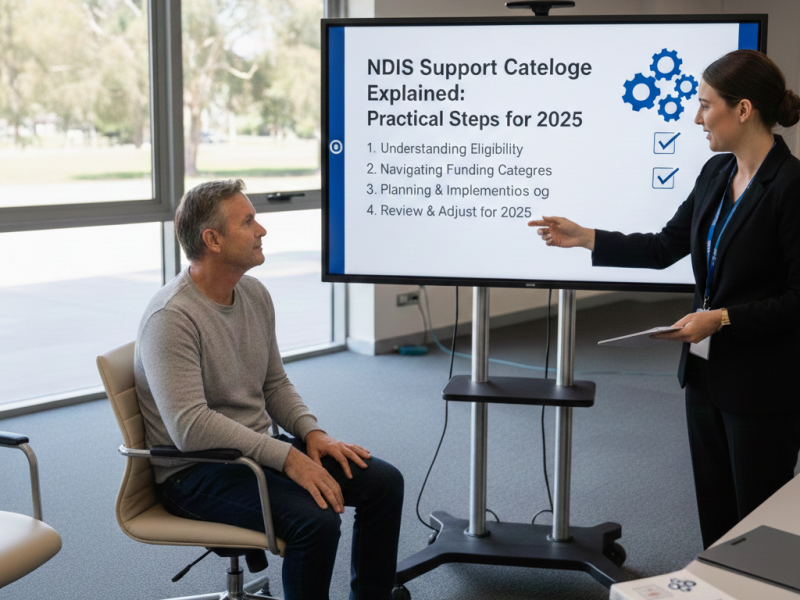Specialist Behaviour Support is a dedicated area within the disability sector that focuses on understanding, preventing, and reducing challenging behaviours. It is particularly relevant for individuals with disabilities or mental health conditions who may require tailored support. Behaviour Support Practitioners play a vital role by using evidence-based strategies to improve quality of life, promote independence, and create safer, more supportive environments for individuals.
Want to Attract More NDIS Clients?
Get expert advice on how to market your services, connect with clients, and grow your practice.
Introduction to the Behaviour Support Practitioner
A Behaviour Support Practitioner is a specialist who is trained in the assessment, planning, and implementation of interventions designed to reduce challenging behaviours in individuals with disabilities, developmental delays, or mental health conditions. The primary goal of a Behaviour Support Practitioner is to support positive behaviour change and improve the individual’s overall quality of life. These practitioners work across a range of environments, including schools, group homes, supported independent living settings, community-based programs and more.
Using evidence-based approaches, Behaviour Support Practitioners develop individualised Behaviour Support Plans that are tailored to each person’s unique needs and circumstances. These plans aim to reduce behaviours of concern while promoting skill development, social participation, and emotional regulation. As part of their role, practitioners often collaborate with families, carers, educators, and other allied health professionals to ensure a coordinated and holistic support approach.
The impact of Behaviour Support Practitioners extends beyond the individual, strengthening the capacity of support networks to maintain safe, consistent, and respectful environments. Their work fosters long-term behavioural change and contributes to more inclusive, supportive settings where individuals with complex needs can thrive.
How to Become a Behaviour Support Practitioner
There are several pathways to becoming a Behaviour Support Practitioner in Australia, but all require a strong educational foundation, practical experience, and a commitment to professional development. Most Behaviour Support Practitioners hold a relevant bachelor’s degree in psychology, social work, occupational therapy, education, or disability studies. Postgraduate qualifications—such as a master’s in Applied Behaviour Analysis or Special Education—can enhance both expertise and employment opportunities in this specialised field.
The typical steps to being a Behaviour Support Practitioner include:
Formal Qualifications:
A diploma or degree in a related field is essential. This academic foundation supports understanding of behavioural science, developmental needs, and disability frameworks.
Professional Development:
Ongoing training, such as the Behaviour Support Development Program (BSDP), helps practitioners build core competencies in assessment, behaviour planning, and positive behaviour support strategies.
NDIS Commission Suitability:
To deliver Specialist Behaviour Support under the NDIS, practitioners must register with the NDIS Quality and Safeguards Commission. This involves submitting an application, providing evidence of supervision, developing a learning plan, and demonstrating core competencies through a professional portfolio.
Supervised Practice:
Early-career practitioners typically work under the supervision of an experienced Behaviour Support Practitioner while gaining hands-on experience with real clients and Behaviour Support Plans.
Continued Learning:
As best practice evolves, ongoing professional development and collaboration with peers remain crucial for delivering high-quality, person-centred support.
This combination of formal learning, practical experience, and structured supervision prepares new Behaviour Support Practitioners to make a meaningful impact in the lives of individuals with behaviours of concern.
Latest Behaviour Support Practitioner Jobs
Demand for Behaviour Support Practitioners in Australia is steadily increasing, reflecting the growing recognition of positive behaviour support within the NDIS sector. Job opportunities are available nationwide, with roles catering to various skill levels and specialisations.
- Positive Behaviour Support Practitioner (Core or Proficient Level): These positions typically involve conducting functional behaviour assessments, developing and implementing Behaviour Support Plans, and collaborating with multidisciplinary teams to deliver person-centred outcomes. Practitioners focus on direct therapy, skill-building, group programs, and training for support staff.
- Senior Behaviour Support Practitioner: Senior roles include managing complex cases, providing leadership, and mentoring junior practitioners to ensure quality service delivery.
- Area Manager – Behaviour Support Practitioner: These positions combine clinical expertise with management responsibilities, supporting teams across multiple locations while maintaining high practice standards.
Many employers now offer flexible work arrangements, including clinic-based, community-based, and work-from-home options, ensuring services are accessible and responsive to client needs. Leading organisations recruiting in this space include Ability Action Australia, Novita, Better Rehab, Real Therapy Solutions, CPBS, and Arriba Group.
Employment criteria typically emphasise formal qualifications, relevant experience, a history of professional supervision, and a commitment to continuous learning. Salaries generally range from $71,000 to $120,000 per year, with higher earnings available for advanced or highly experienced Behaviour Support Practitioners.
Top Skills and Experience for Behaviour Support Practitioners
Successful Behaviour Support Practitioners combine technical expertise with strong interpersonal skills and a genuine commitment to supporting individuals with behaviours of concern.
Assessment Skills:
The ability to conduct thorough functional behaviour assessments to identify the underlying causes of behaviours and guide effective, evidence-based interventions.
Plan Development:
Proficiency in creating tailored Behaviour Support Plans that incorporate best practice strategies and data-driven insights.
Data Analysis:
Skill in collecting, recording, and analysing behavioural data to measure progress and make timely adjustments to interventions.
Communication and Collaboration:
Strong capacity to work closely with families, carers, educators, and allied health professionals, ensuring a coordinated and consistent approach to support.
Empathy and Patience:
Vital for building trust, fostering positive relationships, and supporting individuals with complex needs or challenging behaviours.
Crisis Management:
The ability to remain calm under pressure and implement safe, effective de-escalation techniques when required.
Commitment to Ongoing Learning:
Dedication to professional development, staying current with evolving best practice and NDIS requirements.
Experience working with people with disabilities, in multicultural communities, or within education, community, or residential care settings enhances a practitioner’s effectiveness. Those with leadership, training, or mentoring experience are well-positioned for advancement into senior or specialist Behaviour Support roles.
Is Behaviour Support Practitioner the Right Role for You?
If you want a people-focused career with measurable impact under the NDIS, this role could fit. You’ll use evidence-based practice to understand why behaviours occur, design Positive Behaviour Support Plans, coach supporters, and track outcomes over time.
- Empathetic and patient: You can sit with distress, listen without judgment, and use trauma-informed approaches while you gather ABC data and build trust.
- A clear communicator: You’re confident translating assessment findings into plain English and coordinating with families, schools, SIL providers, and other clinicians so everyone uses the plan consistently.
- A practical problem-solver: You enjoy Functional Behaviour Assessments, identifying function, and designing strategies like functional communication training, visual supports, and environmental adjustments that actually work day to day.
- Committed to learning: You keep up with NDIS Commission updates, restrictive practice rules, and current PBS research, and you seek supervision to grow from Core to Proficient and beyond.
- Safe: You use supervision, debriefing, and time management to protect your wellbeing and maintain safe practice during crises or high-intensity episodes.
- Purpose-driven: You’re motivated by measurable change, like reducing incidents, increasing skills, and fading any regulated restrictive practices documented in a plan lodged with the Commission.
If you’re passionate about coaching supporters, comfortable with data and reporting, and keen to help participants build skills and independence, becoming a Behaviour Support Practitioner is a strong next step.
Referrals Start With Reputation – We’ll Help You Build Both
From networking tips to service refinement, we guide NDIS providers toward lasting impact.
Behaviour Support Practitioner Role Reviews
Practitioners consistently describe the work as deeply satisfying because progress is visible in everyday life: fewer incidents, new skills, better participation, and calmer routines for clients and families. One practitioner summed it up as “extremely rewarding,” saying they finish the day feeling happy about the interactions they’ve had and the progress they’ve witnessed because it directly improves someone’s quality of life.
Day to day, the work is genuinely hybrid. You’ll split time across homes, schools, community settings and clinics, with some telehealth where appropriate. Teamwork is strong, with regular supervision and case discussions that keep plans consistent across families, teachers, Support Workers, and other clinicians.
There are real challenges. Caseloads are diverse and admin is substantial: assessment notes, data entry, plan writing, training records, incident follow-up, and (when relevant) lodgement of Behaviour Support Plans with the NDIS Commission portal. Cultural responsiveness is part of the job in Australia’s CALD communities, so you’ll adapt strategies, use interpreters when needed, and check that plans make sense for the participant’s culture and context.
Overall satisfaction is high among people who enjoy variety, coaching others, and using data to show change. If you’re motivated by measurable impact, comfortable balancing field work with detailed documentation, and keen to keep learning, most reviews suggest you’ll find the Behaviour Support Practitioner role a great fit.
FAQs
1. What does a Behaviour Support Practitioner do?
In practice, a Behaviour Support Practitioner completes a Functional Behaviour Assessment, writes either an Interim or Comprehensive Positive Behaviour Support Plan, trains the participant’s team, and tracks outcomes. Day to day that means ABC observation and data collection, identifying function, designing skill-building strategies like functional communication training, adjusting environments, and coaching staff and family. If a plan includes a regulated restrictive practice, the Practitioner lodges the plan in the NDIS Commission portal, works with the Registered NDIS Provider on jurisdictional authorisation, and reviews data to reduce and eliminate the practice over time. For example, with a participant who is bolting at school pickup, the Practitioner might trial a visual schedule, teach a break request, and introduce graduated exposure while tracking elopement frequency weekly and reporting progress in reviews.
2. What qualifications are required to become a Behaviour Support Practitioner?
You need to be found suitable by the NDIS Commission against the Positive Behaviour Support Capability Framework and usually hold a relevant degree plus supervised practice. Practitioners apply to the Commission for suitability, are assessed against capability levels (Core, Proficient, Advanced, Specialist), and then deliver services through a Registered NDIS Provider that holds the Specialist Behaviour Support registration group. Typical onboarding also includes an NDIS Worker Screening Check, completion of the NDIS Worker Orientation Module, and documented supervision arrangements.
3. What is the salary of a Behaviour Support Practitioner?
Current Australian market ads and aggregators place most roles around ninety to one-hundred and five thousand dollars base, with early-career roles in the low-to-mid seventy to eighty thousands and senior or lead roles commonly advertised at ninety to one-hundred and twenty thousand plus super. Contract roles and regional loadings can lift this further. Factors include experience, capability level, location, whether you work for a Registered NDIS Provider or as a contractor, and responsibility for supervision.
4. What are the key skills of a Behaviour Support Practitioner?
The core toolkit blends evidence and coaching: conducting Functional Behaviour Assessments, writing clear, compliant plans, training teams, and using data to drive change. Specifically, expect fluency in assessment and analysis, person-centred planning, report writing aligned to the Commission’s expectations, trauma-informed and ethical practice, navigating restrictive practice rules and authorisation pathways, de-escalation and crisis response, and disciplined review cycles tied to measurable goals.
5. Where are Behaviour Support Practitioners employed?
Most work for a Registered NDIS Provider registered for Specialist Behaviour Support, often alongside Implementing Providers such as SIL services, community health, and school or hospital outreach teams, with metro and telehealth coverage into regional areas. When a plan includes a regulated restrictive practice, Implementing Providers must obtain state or territory authorisation and complete monthly reporting of use through the NDIS Commission portal, which the Practitioner supports by ensuring the lodged plan is current, specific, and aimed at elimination.


